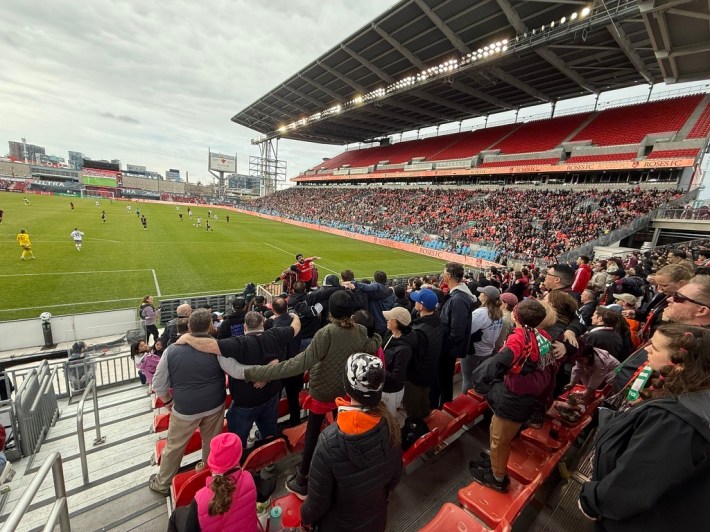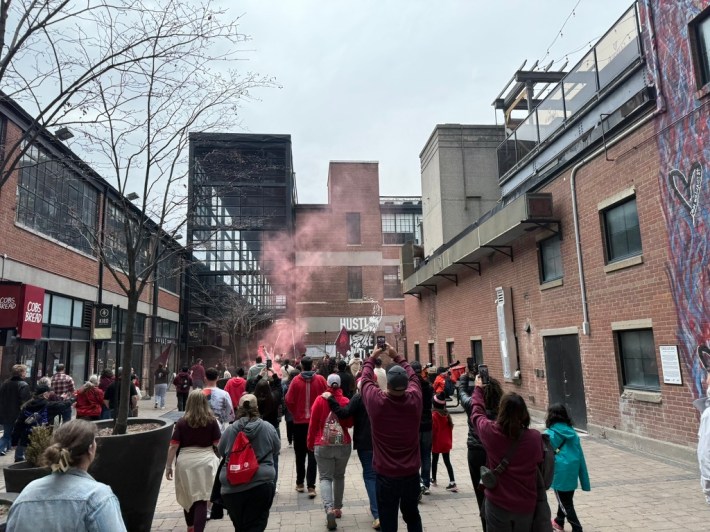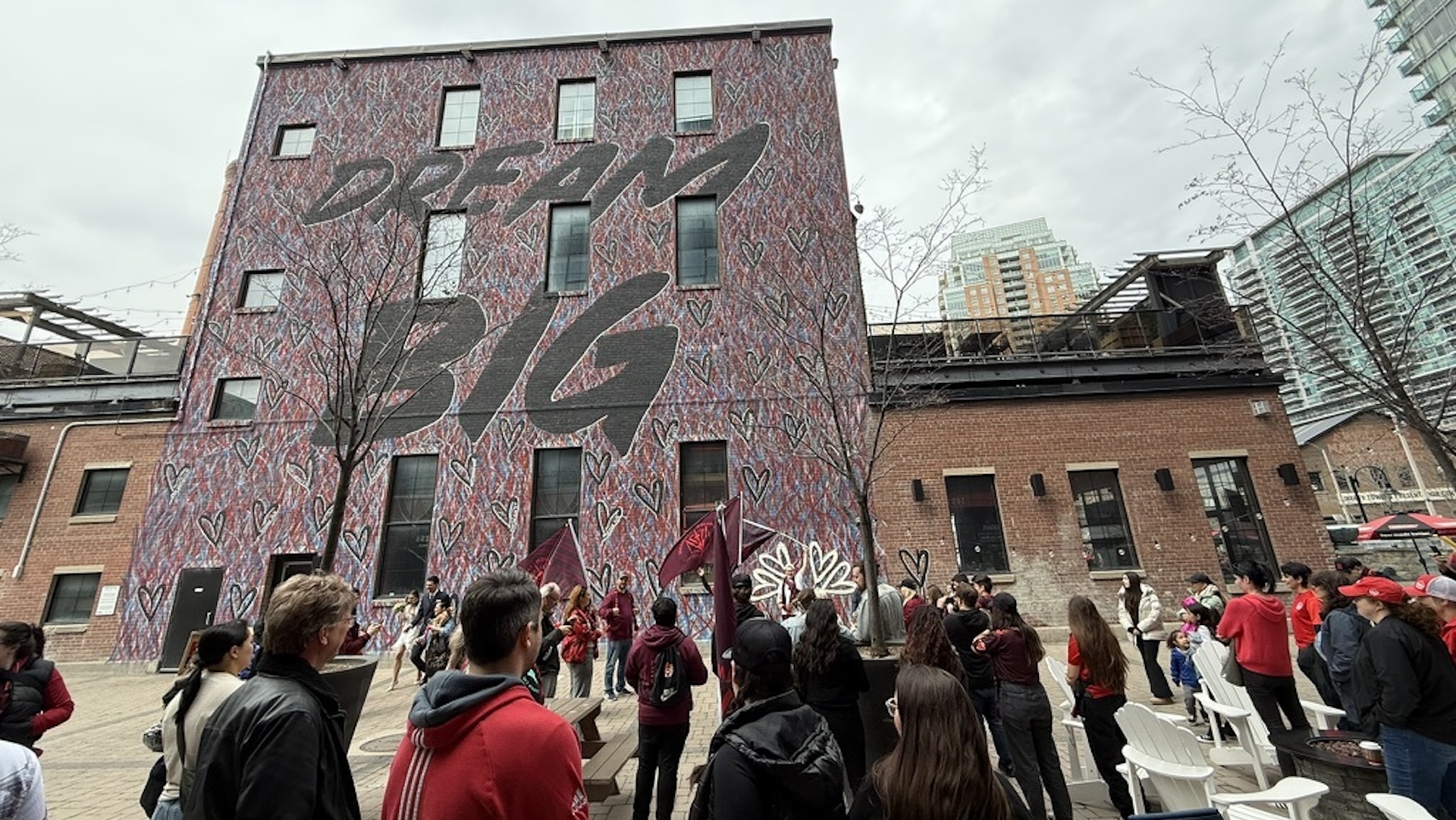TORONTO — For a moment, there was silence. Not even two minutes into AFC Toronto's inaugural match in the National Super League, Canada's brand-new professional women's soccer league, Tanya Boychuk had taken advantage of a nervy mistake to put Montréal Roses FC ahead 1–0. Boychuk was stunned, and so was the sold-out crowd at BMO Field. The hush was biting, but it was soon replaced by what had been there before the goal: singing.
The song was coming from Section 114, where the Vermilion Vanguard stood. The Vanguard is a new independent supporters' group founded by a dedicated set of AFC Toronto fans. It was a windy day at the lakeside, but their chants of "A-F-C TOR-ONT-O," to the tune of the chords of "Seven Nation Army" by the White Stripes, were clear enough for me to hear them from the press box.
Supporters' groups—organizations of zealous fans who chant, play drums, set off colored smoke, and display art in devotion to their team—are a fixture of the soccer world. These groups do more than passionate theatrics, though. They are often responsible for establishing something like a values system within the culture of their club and fanbase. The work done by these groups signals who is welcome, who isn't, and what sort of values every entity in the team's orbit is expected to uphold.
The Northern Super League is a huge victory in itself, but true culture is not trickle-down. At this particular moment, there is precious space for tradition to be built from the ground up. Just like Diana Matheson, who created something out of nothing, a few leaders have stepped up to create AFC Toronto's supporter culture. How does a supporters' group organize itself? How does it decide who and what it represents? To answer these questions, I talked to members of the Vanguard in the week leading up to the match, and I traveled to Toronto to follow their game-day experience up close.

It all started in January 2024, about seven months after the announcement of AFC Toronto's inclusion in the new league, when AC Lang got a direct message on Twitter. The former University of Guelph athlete runs a platform for women's soccer fans called wsoccer.ca, and Helena Ruken, the CEO of AFC Toronto, knew she was based in Toronto. Ruken asked Lang to meet up, and pitched her on the idea of starting a supporters' group. "I was like, 'Why not?'" Lang told me. That summer, wsoccer.ca and the club co-hosted an Olympics watch party at Peaches, a now-closed queer sports bar in Toronto. At that event, Lang tried to find people who were down to help.
Sammi Urbina and Gillian Kilgour were at the watch party, and upon meeting Lang and each other, they were sold. Seeing the bustling event, they realized there was already a sizable group of people in the city enthusiastic about women's soccer; they just needed a home base. "Somebody just needed to rip the band-aid, somebody just needed to start the community, and the people will start coming," Urbina told me.
The following January, Sonja Cori Missio caught wind of the Vanguard on social media. She became a member and volunteered to be the group's president. She's been involved in soccer for a long time, including supporter culture, and she wanted to give back to the sport. "I didn't want to just be like, 'OK, I'll show up when you tell me,'" she said. Instead, she thought, "I really want this club to succeed from a fan point of view. What can I actually do to do that and basically put my money where my mouth is?"
Once there was a group of about six leaders committed to making the Vanguard a reality, they hit the ground running. Just like creating a league from scratch, building a supporters' group "takes money … it takes passion, and it takes a little bit of blind faith," Missio said. She compares the process to starting a small business. Everyone pitched in as much as they could with whatever they could. Tasks included late-night calls among the leadership group, moderating Discord chats, designing and ordering custom flags and merchandise, figuring out what to charge for membership, posting to Instagram, responding to emails, communicating with the club, and getting trained in using pyrotechnic smoke.
The group also had to decide on a name. "Vermilion Vanguard" was one submission of many in a democratic voting process. Missio is "gutted" that "Maroon Raccoons"—a nod to the (in)famous residents of Toronto—didn't win, but she hopes to put an image of a maroon raccoon on a tifo sometime.
A particularly difficult task was finding a bar that would host the Vanguard's pre-match gathering. Not until three days before the first game was Missio able to secure a location. "I contacted a bunch of bars, and they were like, 'Sorry, Marlies are playing,'" she said. The Toronto Marlies are a men's hockey team that competes in the American Hockey League. Missio was frustrated that she presented so many places with "this chance to have this historical moment, and they're like, 'Eh, hockey's on.' And I know that's just being very simplistic, but we've been hearing the same messages for years and years and years, so it's kind of hard not to take it as, 'Eh, something's more important.'" Eventually, Something In The Water Brewing Co. agreed to host the Vanguard before the match.
A new league brings an unusual opportunity to reimagine what kinds of people are welcome in soccer spaces. For so long, women's sports have been marketed toward children; that is no doubt still an important audience to reach, and a couple young kids who play on the same youth soccer team were a lively part of the pregame gathering. But, as Missio explained, "There's just also so much opportunity to not pigeonhole ourselves and be like, 'Look how great this is for young women.' It's great for everyone. It's great for anyone who loves the sport."
Decentering kids from their marketing is key for one of the Vanguard's immediate goals: getting rowdy. As Kilgour put it before the match, the Vanguard would be "responsible for vibes at BMO." Noise and color are supporters' best tools to make their passion known to their team's players. The drums, the chants, the flags, the smoke: All of it is, as Missio said, "for the players to know, 'Holy shit. People want us here.'"
Torontonians, with a large buffet of local professional sports, care a lot about cheering on their city's teams—something that the Vanguard certainly hopes to take advantage of. But sports's popularity in the area has a dark side. Many fans, like Jason Tsotsos, have been priced out from regularly attending their favorite team's matches. "I grew up a Leafs fan without ever being able to actually go to games," he told me. Even though it takes Tsotsos up to two hours to travel to BMO Field from his home in Kitchener, the diehard Toronto soccer fan is happy to make the trip, especially since AFC Toronto season tickets are affordable, unlike those for Toronto FC of the MLS. The Vanguard hopes that AFC Toronto games are an appealing, accessible option for all stripes of sports fans and sports-curious folks in the region.
Urbina is already seeing the effects of marketing toward all kinds of people. Before game day, she had already met some members. "Everybody's story is so wildly different about why they're here and why they're showing up," she said.
The Vanguard leaders are well aware that there are many folks who might be interested in supporter culture but have never actually been involved in a group before; indeed, that's the case for Lang and Urbina themselves. Thus, they've made sure to give thorough explanations of everything the group does, developed a code of conduct, printed song sheets for the match, and encourage members to get involved in helping out with tasks, even if they have no experience doing it. Urbina said they want to make sure that "if you're new to the sport, or you're new to women’s soccer, there is a place for you."
Emma Whyte, for example, has been a longtime fan of the Canadian national team, but has never been involved in supporter culture. She heard about the Vanguard at an event for the national team and decided to give it a whirl. She's learning as she goes, and has already contributed to the group by helping paint banners before game day. Whyte said it's been "great to meet all these people who are interested in the same stuff."
For Berit Brune and Caitlin Ehlenz, the opportunity for new friendships was also a big appeal of the Vanguard. The avid women's sports fans haven't met a lot of fellow soccer lovers since they moved to Toronto from Germany four years ago. They found the Vanguard on Instagram and thought getting involved would be a great way to build their community and "support the sport," said Ehlenz.

As I watched these supporters chat and bond with each other at the bar before the game, I couldn't help but think about less organic efforts to create a fan culture. NWSL commissioner Jessica Berman recently announced that as part of the league's partnership with Alex Cooper's beverage company, Unwell Hydration, there will be a "league supporters' group" called Unwell FC. Cooper, who hosts the Call Her Daddy podcast, will be "leading those groups in their excitement and support for women's soccer."
Before game day, I had mentioned Berman's proposal to a few Vanguard leaders, and, like multiple leaders of supporters' groups in the NWSL, they were each skeptical. Missio said it seems like the NWSL is "trying to capitalize" on the passion of the fans. "What makes you think that you can essentially copy this, put a trademark on it, and then sell it out?" she said. "There is so much work and sweat and tears and, you know, me missing a bedtime for my kid because we have a meeting."
Kilgour pointed out that Cooper's brand flies in the face of efforts by independent supporters' groups to make the league inclusive to all fans; she said Call Her Daddy, which started as a Barstool Sports podcast, is "never something that I, as a gay woman, would ever want to go anywhere near."
Ultimately, the NWSL's plan would collapse the distance between the supporters' group and the league—a separation that the Vanguard said is key to their ability to fulfill their purpose. The Vanguard has always been a fully independent group, with a priority on supporting the players, not the club or league. To Missio, this is necessary due to diverging priorities. Front offices, she said, are concerned with "'What's going to put the most eyes on us?' Whereas a true supporters' group doesn’t give a shit about whose eyes are on them, other than the players." So far, the Vanguard's relationship with the club has been smooth sailing, which has been helpful as they had to be in constant communication before the first match. "They are very, very supportive, but we don't work for them. We don't represent them," Missio said.
In these early stages, the NSL is just finding its footing. But as the league grows and more money comes into the picture, it's not unlikely that front offices might start making decisions that prioritize branding or finances over the wellbeing of players and fans. The Vanguard's leaders are well aware of this possibility. "If shit hits the fan," Urbina said, the Vanguard will be compelled to make it known that they support AFC Toronto's players, not the front office.
In the United States, shit's hitting the fan. Transphobia has infected the sports world, and legislation meant to hurt trans people is being implemented around the country. (Similarly ghoulish things are happening in Britain, another women's soccer hotspot.) It's one of the reasons Quinn, the transgender, nonbinary Canadian star, decided to leave the Seattle Reign for the new Vancouver Rise. The Trump administration and major institutions' capitulations to it have had other horrifying effects on sports. For instance, multiple international NWSL players didn't feel that they could safely leave the country to play for their national teams earlier in April.
As comparatively progressive as Canada tends to be, the country is by no means free of dangerous conservatism. The current federal election is only highlighting the potential that things could very easily go, well, south. Indeed, the NSL has already had its first public encounter with hatred. In March, Latifah Abdu of the Roses spoke out against the racist and misogynistic messages she'd received online. The league and Montreal front offices publicly supported her.
The Vanguard's leaders say they are dedicated to making their group and the league as a whole a safe place for marginalized players and fans. "We recognize what's going on in the world right now," Missio said. "If for 90 minutes, we can create a safe space for somebody or create a happy space for somebody, then that is what we want to do." This inclusive ethos is foundational to everything the Vanguard does. For instance, when the leaders were discussing the flags they'd need to order for game day, an inclusive pride flag and a transgender flag were quickly mentioned as non-negotiable. On game day, those vibrant flags stood out as they flew in a sea of custom-made Vermilion Vanguard flags in section 114.
Kilgour said she hopes the Vanguard can carve out a safer space than supporters' groups for men's teams usually do. In her experience around those groups, "when you mention anything about women, gay people, trans people, they start attacking you, and it's truly the most vile thing ever." But women's sports can't just rely on not being men's sports as a safeguard against bigotry—inclusion takes hard, consistent work to nourish. The Vanguard's leaders insist this work is worthwhile, and not only for its effects on the soccer world. Missio sees supporter culture as an opportunity to stand up to prejudice that is bigger than soccer. "Those little acts of resistance build up over time," she said.

At the bar before the game, folks chatted, grabbed Vanguard merch, and watched a York United FC game on TV. There was an excited yet comfortable air in the room. That changed, however, about two hours before kickoff. A stream of people came charging into the bar flying burgundy flags, and everyone let out a loud cheer. It was the Vanguard's game-day crew, who had been at the stadium to set up the supporters' section. One of the crew had a booming voice and called out, "You guys are NOT drunk enough!" Like magic, the bar became much more lively and the thrum of anticipation intensified. It was go time.
After one of the Vanguard's capos delivered a rousing speech outside the bar, the group was off. They marched to the stadium in a plume of red smoke, chanting "AFC Toronto" in various tunes and tempos. Upon reaching the stadium, where a line of ticket holders waiting to enter stretched the length of a field, they were greeted by whoops and cheers. The Vanguard's section was the first in the stadium to fill up.
Having been with the Vanguard for so long before the match, I almost forgot there would be an opponent. In her speech outside the bar, the capo couldn't even bring herself to say the word Montreal; it was only "a team from Quebec." It seemed like most of the stadium felt the same way; Boychuk's sudden goal put a severe, unexpected damper on the previously celebratory mood.
The crowd would briefly come to life whenever Toronto had a scoring chance, but otherwise it was the Vanguard's chanting and a group of nearby drummers that were most audible from the press box. At halftime, Missio reflected: "It's just been incredible to see this, to make it actually real. I've been at a couple of firsts here at BMO, and this one is just electric. This crowd is so into it. The players are into it. This is just a dream come true."
Despite their cheering, the second half never gave the home fans the euphoric release of celebrating a goal; Anna Karpenko's goalkeeping shut out AFC Toronto. After the final whistle blew, attendees filed out of the stadium, but the Vanguard's section remained full, flags unfurled. They were the first ones in and last ones out, always at attention for their players.
AFC Toronto manager Marko Milanović and captain Emma Regan praised the home crowd while speaking to reporters after the loss. They both thanked the attendees for creating such a supportive environment, and apologized for not performing as they felt the fans deserved. "Especially in moments where things aren't going our way, feeling the crowd at our back is really important," Regan said. "I'm sorry to the fans we couldn't get the win, but we appreciate them coming out, and it's a big game-changer to have them there."
A few days after the game, Urbina told me the Vanguard had received scores of grateful messages for the "energy we brought to the match" from both fans and the team itself. The Vanguard's enthusiastic presence at the match clearly was undeniable, and with 60 paid members and counting, that impact is sure to grow. "This was just day one," Missio reflected. "We have an entire future ahead of us, and that, to me, is incredible."






